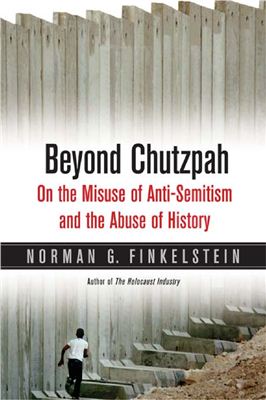University of Califoia Press; 1 edition (August 28, 2005). 345
pages.
Finkelstein, a political science professor and author of The Holocaust Industry: Reflections on the Exploitation of Jewish Suffering, has conducted a rancorous public feud with Harvard Law professor and pro-Israel stalwart Alan Dershowitz over the latter's The Case for Israel, and here expands his arguments into a vigorous polemic on the Israeli-Palestinian conflict. The first part of the book examines what he feels is a growing tendency of pro-Israel commentators to use spurious charges of anti-Semitism to deflect and discredit legitimate criticism of Israel. The second, much longer, part is a line-by-line debunking of The Case for Israel, which he compares to Communist apologetics for Stalinist Russia. Rebutting Dershowitz's claims about Israel's "superb" human rights record, Finkelstein cites human rights organizations like Amnesty Inteational, Human Rights Watch and the Israeli group B'Tselem to document Israeli abuses in the occupied territories, including killings of Palestinian civilians, torture of Palestinian prisoners and home demolitions. Lengthy appendices flesh out his explosive assertion that Dershowitz plagiarized the historical research and interpretations (but not the actual phrasing) of Joan Peters's From Time Immemorial. The Middle East conflict rarely inspires calm discussion, and Finkelstein duly pillories his opponents as perpetrators of "hoax" and "fraud" who lack "ordinary moral values" and whose behavior resembles anti-Semitic stereotypes. Inflammatory rhetoric aside, he does raise serious questions about the veracity, scholarly methods and faiess of Dershowitz and others. More important, he presents a wealth of evidence on the human rights situation in the occupied territories, so often ignored in American debate on these issues. Exhaustively researched and meticulously-if intemperately-argued, Finkelstein's book is a formidable challenge to the conventional wisdom on the Middle East.
Finkelstein, a political science professor and author of The Holocaust Industry: Reflections on the Exploitation of Jewish Suffering, has conducted a rancorous public feud with Harvard Law professor and pro-Israel stalwart Alan Dershowitz over the latter's The Case for Israel, and here expands his arguments into a vigorous polemic on the Israeli-Palestinian conflict. The first part of the book examines what he feels is a growing tendency of pro-Israel commentators to use spurious charges of anti-Semitism to deflect and discredit legitimate criticism of Israel. The second, much longer, part is a line-by-line debunking of The Case for Israel, which he compares to Communist apologetics for Stalinist Russia. Rebutting Dershowitz's claims about Israel's "superb" human rights record, Finkelstein cites human rights organizations like Amnesty Inteational, Human Rights Watch and the Israeli group B'Tselem to document Israeli abuses in the occupied territories, including killings of Palestinian civilians, torture of Palestinian prisoners and home demolitions. Lengthy appendices flesh out his explosive assertion that Dershowitz plagiarized the historical research and interpretations (but not the actual phrasing) of Joan Peters's From Time Immemorial. The Middle East conflict rarely inspires calm discussion, and Finkelstein duly pillories his opponents as perpetrators of "hoax" and "fraud" who lack "ordinary moral values" and whose behavior resembles anti-Semitic stereotypes. Inflammatory rhetoric aside, he does raise serious questions about the veracity, scholarly methods and faiess of Dershowitz and others. More important, he presents a wealth of evidence on the human rights situation in the occupied territories, so often ignored in American debate on these issues. Exhaustively researched and meticulously-if intemperately-argued, Finkelstein's book is a formidable challenge to the conventional wisdom on the Middle East.

